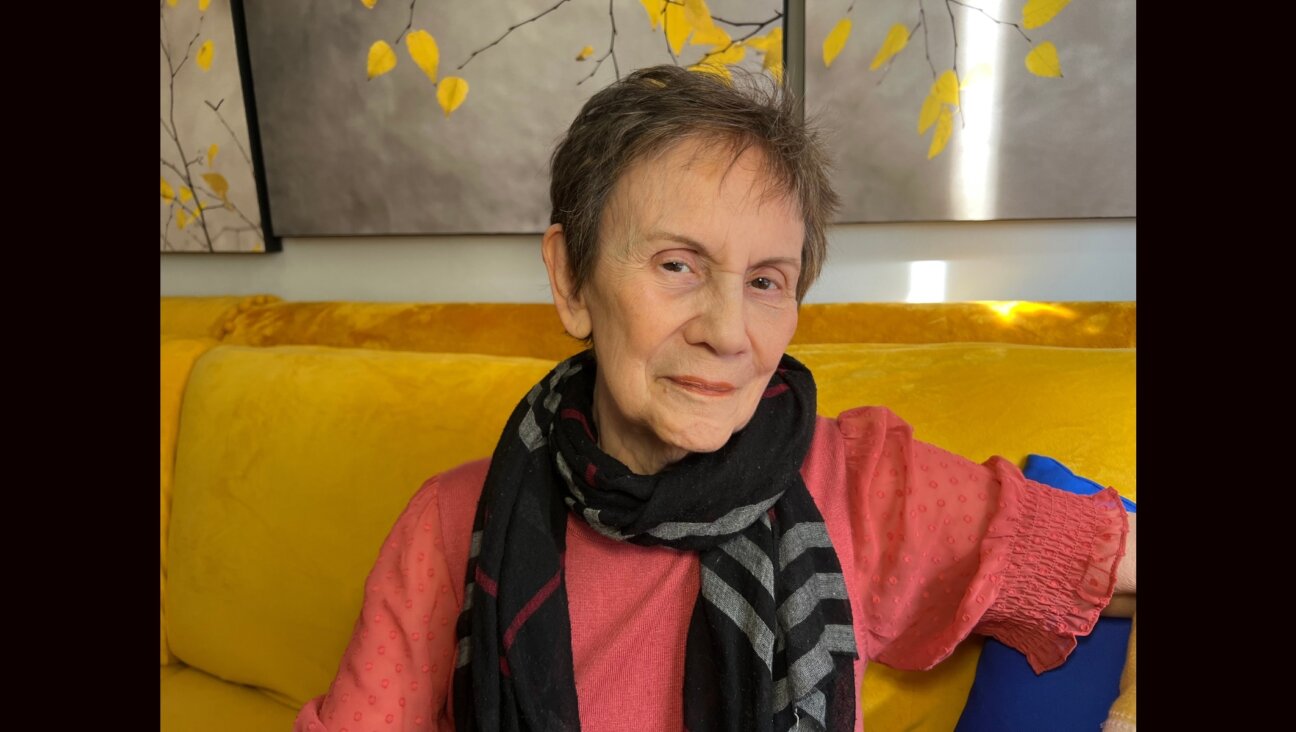Jewish Poetry Gets Its Breakout Star
Last News of Mr. Nobody
By Emmanuel Moses
Handsel Books, 168 pages, $17.
Over the past five years, the vacant space of contemporary Jewish literature slowly began filling up with such names as Nathan Englander, Jonathan Safran Foer and Gary Shteyngart. Then came others: Myla Goldberg, Nessa Rappaport, David Bezmozgis. Yet, curiously, all these, and a large number of others, worked the prose genre, mostly as short story writers and novelists. The Jewish poetry scene remained desolate. Speculations about the first major Jewish poet of the new generation gradually achieved messianic proportions. Will he come from Brooklyn or from Jerusalem? Will he be politically charged, or idealistically romantic? New formalist or postmodernist?
For many readers, Emmanuel Moses’s upcoming collection, “Last News of Mr. Nobody,” will answer these questions. The anthology, his first selection of poems in English translation, spans 14 years and presents a progressive experimentation with different styles, forms, ideas and voices. With translation spearheaded by an award-winning trio of poets — Marilyn Hacker (National Book Award winner in 1975), C.K. Williams (Pulitzer Prize winner in 2000) and Notre Dame professor Kevin Hart — this exquisite compilation is, in Moses’s own words, a journey “between various stations with names that crunch/like pretzels.”
Moses was born in Casablanca, Morocco, in 1959, then spent his childhood in France and his teenage years in Israel before moving back to Paris in his late 20s. Given his background, it is perhaps unsurprising that “hotel” and “dream” are two of the collection’s most often used words. The work explores the centuries-old themes of Jewish identity, self-definition and belonging, while remaining unmistakably modern, both thematically and stylistically. The poet seems to traverse, half-asleep, between Geneva, Amsterdam, London and Zurich until countries and nationalities converge into one big stream of memories. It is so Proustian, this need to travel in order to remember something that happened somewhere else. When memories return, they are overlaid with new ones, and drift in on a shroud of dreamy fog, as in: “I didn’t even see my grandmother die/I thought that she was still breathing under the sheet/And her coffin was like a suitcase/Where someone hides to cross the border/Without being seen.”
Irony permeates Moses’s world, even in moments meant to be gravely self-inquisitive or highly romantic, as when he writes: “All the beloved/Dead will take their places, like a board of directors of the past.” At times, this irony borders on sarcasm and humorous self-resignation and thus reminds the reader of Yehuda Amichai, the great Israeli poet whose works Moses has translated extensively. Much like Amichai, Moses mingles biblical references and sexuality, and zestily sprinkles his verse with names of streets and cafés of Tel Aviv and Jerusalem. One poem mentions the “[restaurant] Leah Rehavy, across the street/From the public high school, where I’d invited Anat Teitelboim/With no ulterior motive[,?] though she was up for everything.”
Generally, though, Moses tends to be subtler than Amichai. He avoids giving direct confrontation to issues such as the Holocaust, unending spiritual qualms or the political turmoil surrounding Israel. For example, he tells us only that “During the war of Yom Kippur, I served/As a postman and brought to worried mothers/News of their boys/During Sadat’s visit to Jerusalem I watched/For each official procession.” What does he mean here? Perhaps that he chose to be a postman rather than a paratrooper, that somehow his involvement in the situation had more to do with letters and words, emotions and hopes, rather than with combat? Mention of the 1977 historical visit of Egyptian President Anwar Sadat to Jerusalem, evokes the hopes for peace, without taking sides politically. A reader can’t infer an author’s political stand — it is, instead, a stand of a poet.
Moses’s subtlety is not merely confined to discussions of Jewish history, but is rather an overarching approach to the whole world. The colors evoked in his imagery — mauve, dusty gray — are, too, of the quieter sort. Pink here is certainly not the Prada kind of pink, but that of Hamburg; a “city pink/As a salmon beside its oily river.” In what one might guess to be an autobiographical sketch, Moses writes, “Yellow, the afternoons at his grandparents’/Yellow, his first kiss/Yellow, a certain nineteenth of June/Yellow, the slight and reflexive words of his poems.” Here, he invokes the color of his childhood — of desert, sand and sun — and at the same time, symbolically introduces the feeling of uncertainty, which is neither red nor green, neither stop nor go, but hesitantly yellow, like the first kiss.
The marginalized standing of the excellent publishing house Other Press — as well as of the poetry genre in general — might cause this collection to remain within a small circle of connoisseurs. But mainstream readers should be sure not to miss it. It’s a crucial milestone in contemporary Jewish literature.
Jake Marmer is a doctoral candidate at The City University of New York, and managing editor of the Mima’amakim Journal of Jewish Art.
The Forward is free to read, but it isn’t free to produce

I hope you appreciated this article. Before you go, I’d like to ask you to please support the Forward.
Now more than ever, American Jews need independent news they can trust, with reporting driven by truth, not ideology. We serve you, not any ideological agenda.
At a time when other newsrooms are closing or cutting back, the Forward has removed its paywall and invested additional resources to report on the ground from Israel and around the U.S. on the impact of the war, rising antisemitism and polarized discourse.
This is a great time to support independent Jewish journalism you rely on. Make a gift today!
— Rachel Fishman Feddersen, Publisher and CEO
Support our mission to tell the Jewish story fully and fairly.
Most Popular
- 1

Opinion The dangerous Nazi legend behind Trump’s ruthless grab for power
- 2

News Who is Alan Garber, the Jewish Harvard president who stood up to Trump over antisemitism?
- 3

News Student protesters being deported are not ‘martyrs and heroes,’ says former antisemitism envoy
- 4

Opinion What Jewish university presidents say: Trump is exploiting campus antisemitism, not fighting it
In Case You Missed It
-

Culture In ‘Andor’ season 2, a Wannsee Conference reference, and a new sort of space Jew
-

Culture Did this Jewish literary titan have the right idea about Harry Potter and J.K. Rowling after all?
-

Opinion The profound Yom HaShoah lesson we desperately need to remember under Trump
-

Opinion How Trump’s attacks on the university target what has made America great for Jews
-
Shop the Forward Store
100% of profits support our journalism
Republish This Story
Please read before republishing
We’re happy to make this story available to republish for free, unless it originated with JTA, Haaretz or another publication (as indicated on the article) and as long as you follow our guidelines.
You must comply with the following:
- Credit the Forward
- Retain our pixel
- Preserve our canonical link in Google search
- Add a noindex tag in Google search
See our full guidelines for more information, and this guide for detail about canonical URLs.
To republish, copy the HTML by clicking on the yellow button to the right; it includes our tracking pixel, all paragraph styles and hyperlinks, the author byline and credit to the Forward. It does not include images; to avoid copyright violations, you must add them manually, following our guidelines. Please email us at [email protected], subject line “republish,” with any questions or to let us know what stories you’re picking up.













